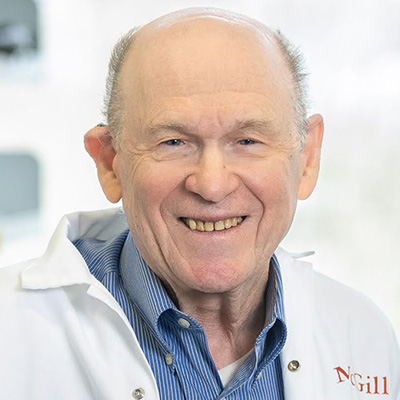Sonenburg joins hall of fame; mentoring award for Hanna–Rose; Black named to research council
Sonenberg joins medical hall of fame
Nahum Sonenberg, chair in biochemistry at the Goodman Cancer Institute at McGill University in Montreal, is one of six scientists and physicians named this year to the Canadian Medical Hall of Fame.

Sonenberg has authored more than 800 scientific studies, book chapters and reviews. His work has added to the understanding of viruses, cancer growth and development, memory, brain plasticity, spatial learning and autism spectrum disorders.
Born in a German displaced persons camp to parents who were Jewish Holocaust survivors from Poland, Sonenberg moved as a young boy with his family to Israel. There, he earned his Ph.D. in biochemistry from the Weizmann Institute of Science and went on to postdoctoral studies at the Roche Institute of Molecular Biology before joining the McGill faculty in 1979.
Sonenberg has earned a host of other awards including the 2018 Prix du Quebec, the 2014 Wolf Prize in Medicine, the 2013 McLaughlin Medal of the Royal Society of Canada, the 2011 Lewis Rosenstiel Award and the 2008 Canada Gairdner International Award.
Hanna–Rose wins faculty mentoring award
Wendy Hanna–Rose, a professor of biochemistry and molecular biology at Pennsylvania State University, is one of two faculty members at the Eberly College of Science selected to receive the college’s Distinguished Faculty Mentoring Award in 2023.

Hanna–Rose was nominated for her efforts to engage and mentor graduate students and faculty, especially those from marginalized communities, according to a PSU news article. The other award recipient is Runze Li, a professor of statistics.
With the aim of empowering women to create a better future for themselves, their colleagues, their students and Penn State, Hanna-Rose developed the Changing The Future leadership program. A total of 111 women from University Park colleges and other Penn State campuses have completed the program since it began in 2019 — 24 from Eberly College of Science. Many have gone on to leadership positions in their departments, institutes, centers and colleges.
Hanna–Rose also co-founded Leading for Advocacy and Action for a Diverse Leadership, a network of women faculty at Penn State who advocate for equity and an improved climate for women and marginalized groups at the university.
In her lab, Hanna–Rose uses the nematode Caenorhabditis elegans to study how perturbations in the metabolic network result in physical and behavioral outcomes. Her research focuses on how loss of activity of certain enzymes involved in purine synthesis results in muscle ataxias, behavioral deficits and reproductive dysfunction and how manipulations of pathways for synthesis of the metabolite nicotinamide adenine dinucleotide result in specific sensory and developmental phenotypes.
Hanna-Rose received the 2018 Milton S. Eisenhower Award for Distinguished Teaching from Penn State, the 2014 Excellence in Teaching Award from the National Society of Leadership and Success and the 2007 C.I. Noll Award for Excellence in Teaching from the Eberly College of Science.
Black appointed to research council

Gov. Ron DeSantis has appointed American Society for Biochemistry and Molecular Biology member Stephen Black and three other scientists to the Florida Biomedical Research Advisory Council. The council advises the surgeon general on the James and Esther King Biomedical Research Program, the Bankhead-Coley Cancer Research Program and the Live Like Bella Pediatric Cancer Research Initiative. Black’s duties will include discussing program priorities and goals as well as evaluating program initiatives.
Black is the associate dean for research at the Herbert Wertheim College of Medicine and the director of the Center for Translational Science at Florida International University. His research takes a translational and integrative approach to investigating the role of oxidative and nitrosative stress in the development of pulmonary hypertension, lung injury and stroke.
Over the past 20 years, Black has been awarded $50 million in funding from the National Institutes of Health, the American Heart Association, the March of Dimes Foundation and the Leducq Foundation. He is funded by multiple NIH grants, including two P01 awards focused on ventilator-mediated lung injury and pulmonary vascular disease.
Enjoy reading ASBMB Today?
Become a member to receive the print edition four times a year and the digital edition monthly.
Learn moreGet the latest from ASBMB Today
Enter your email address, and we’ll send you a weekly email with recent articles, interviews and more.
Latest in People
People highlights or most popular articles

Simcox wins SACNAS mentorship award
She was recognized for her sustained excellence in mentorship and was honored at SACNAS’ 2025 National Conference.

From humble beginnings to unlocking lysosomal secrets
Monther Abu–Remaileh will receive the ASBMB’s 2026 Walter A. Shaw Young Investigator Award in Lipid Research at the ASBMB Annual Meeting, March 7-10 in Washington, D.C.

Chemistry meets biology to thwart parasites
Margaret Phillips will receive the Alice and C. C. Wang Award in Molecular Parasitology at the ASBMB Annual Meeting, March 7-10 in Washington, D.C.

ASBMB announces 2026 JBC/Tabor awardees
The seven awardees are first authors of outstanding papers published in 2025 in the Journal of Biological Chemistry.

Decoding how bacteria flip host’s molecular switches
Kim Orth will receive the Earl and Thressa Stadtman Distinguished Scientists Award at the ASBMB Annual Meeting, March 7–10, just outside of Washington, D.C.

Thiam elected to EMBO
He was recognized during the EMBO Members’ Meeting in Heidelberg, Germany, in October.
